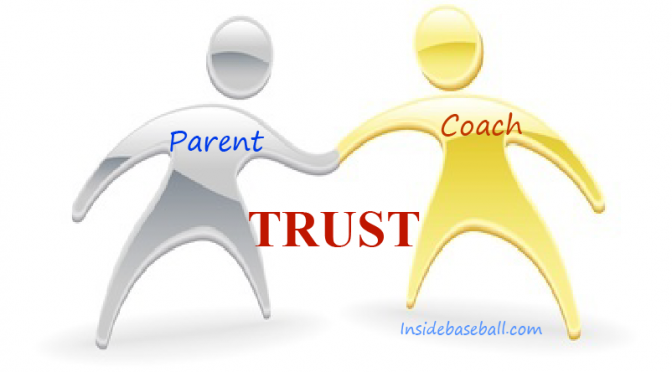How to Develop Trust Between Coaches and Parents
Let’s be real: the relationships between coach and parents can have as much impact on a season as the relationships between the coach and the players themselves. These relationships are good or bad depending on how parents and coaches can build trust between each other, relate to one another and their different goals and roles in the young athlete’s life.
When it comes to parents, it’s a safe assumption that most of them care primarily for the interests of their kid, no matter how much they understand the importance teamwork. Similarly, parents may know a lot about ethics and fair-play, but at the end of the day they often want to see their child out front and to see them win.
On the other side of the fences, coaches have to actually coach the kids, every practice, every game, the whole season. The endless hours spent drilling, going over proper form, pushing limits, keeping the program on track – it all falls to the coach.
Good coaches follow their hearts and can’t be overly influenced by what parents and other coaches say to them or about them. Good coaches don’t have to be popular, but they must be respected, by athlete and parent alike. But looking at these different perspectives, it’s easy to see how these two groups, with different perspectives, might bump heads. That isn’t always – and shouldn’t have to be! – the case.
Healthy communication is the key to developing respect and trust between coaches and parents. This means developing shared expectations, giving each other breathing room, understanding roles, keeping the communication productive, and remembering to keep the feedback coming.
Shared expectations. What is expected of the young athlete and what should they themselves expect? At the beginning of the season, the coach should take the time to sit down with each player and their family to talk expectations. What’s the plan for this player? Hours per week at practice, expectations outside of practice, expected position, skills to be developed, discipline and attitude expected should all be talked about ahead of time, so that everyone’s in the know about what the season has in store. This is very helpful for addressing any differences between the responsibilities and positions the coach has in mind for the player, and the responsibilities and position the player, or their parents, may have hoped for.
Breathing room. Things don’t always go as planned during the season and certainly, from game to game, tempers can flare. Parents should consider a 24-hour cool off period as a good rule of thumb before making that phone call to a coach or another parent. For a coach, post-game and post-practice is not the best time to successfully compose the most thoughtful and sensitive critical feedback to a young player or parent. Coaches and parents should give themselves, and each other, room to breathe. As the saying goes: “sleep on it.”
Understanding roles.
Put another way: “yelling is not personal.” Coaches are motivators as well as teachers and councilors. Some coaches are quiet and nurturing, while others get red in the face and can be heard two counties over. At the end of the day, majority of coaches care deeply about the kids they work with. Coaches need to make a point of reassuring – and demonstrating to – parents that their intentions are instructive and encouraging, and not meant to demean or personally criticize young players. This doesn’t give coaches the right to be abusive, but it is an area where content is far more important than form, and parents should try to be understanding, within reason.
Productive communication. It’s an all-too-common occurrence for coaches to “meet” with parents where other parents and players can see. People tend to see things more broadly and keep cooler heads when they don’t feel the need to save public face. Keep the meetings off-location and as private as possible. Also important: it is inappropriate for parents to talk negatively about other players. Debating who does or does not belong on a team or remarking aloud on other children’s playing ability creates a toxic environment that is counter-productive to team spirit and the success of the team and individual players.
Feedback. Coaches should make and maintain simple checklists and reminders of what they want to communicate with parents, and give that feedback throughout the season. Good coaches don’t just dump their systems on the team, they respect the value of meaningful, continuous communication with their players’ parents.
Developing strong and healthy lines of communication between coaches and parents is essential to building trust. Coaches and parents play different but overlapping positions in a young athlete’s life. Developing shared expectations, extending empathy to one another, understanding roles, keeping communication positive and healthy, and keeping lines of communication open will help foster the teamwork needed to support young athletes play and grow throughout the season.

